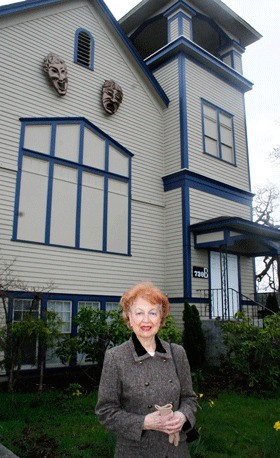It was considered a “miracle” in 1980 when a small group of theater buffs made a permanent home for the Whidbey Playhouse on Oak Harbor’s Midway Boulevard.
What began as a semi-nomadic company performing in elementary schools and the basement of credit unions is today an engaging theatrical enterprise on the grounds of a historic former church.
“In the course of my life, it was one of the great community efforts of all time,” said Wallie Funk, a chief playhouse fundraiser and former Whidbey News-Times editor and co-publisher. He is now in his 80s and lives in Anacortes.
It ultimately took over $300,000 and the affection of an entire town to create what a 1983 theater marquee proudly proclaimed, “The Miracle on Midway,” and this year will be the building’s 30th anniversary. To celebrate, audiences will have a sneak peak at upcoming plays this season, and past actors will perform a musical tribute tonight.
“We expect a full house,” said Mary Lou Chandler, a long-time producer and director.
Some of the audience members will have loyally followed the Whidbey Playhouse through various incarnations over the years. Funk said that through its good and bad times, the playhouse has always been held together by one bonding agent: community.
“There were so many extraordinary things that happened and so many people who came through,” Funk said. “The list is almost too long to recite.”
In 1966, the Whidbey Playhouse began as a small troupe of actors who made their public debut with a one-act play at Kathryn Johnson’s dance studio. Without a theater of its own, the group managed three to four productions a season over 13 years. They often performed in the former high school cafeteria and Crescent Harbor Elementary, and later they leased a converted church.
There were roadblocks, Funk said, such as a fire that razed the first “permanent” quarters in 1973 and the resulting uncertain availability of facilities.
But by 1979, the search had ended for a permanent space. The vacated Christian Reformed Church on Midway Boulevard was put on the market-— for a whopping $250,000.
The playhouse board split into two groups, Funk said: a group to manage the plays and a group of business-savvy folks who could find money. They had only five years to pay off the mortgage.
At first, they started with the standard avenues, such as auctions and garage and bake sales, but it wasn’t bringing in enough. As Funk recalled, the interest rates were extremely high at that time.
By 1981, Funk said the playhouse was pressed to pay $16,000. In a dramatic move, he asked 16 people to sign a loan for $1,000 each. His concession was that he would pay the entire loan back himself if the theater failed.
“It was a desperate time but it got us over a big hump. I did not have to sell my children,” Funk joked.
As the editor of the Whidbey News-Times, Funk also kept the community updated with frequent editorials about the fundraising. In one of his final fundraising pieces Funk wrote, humorously, “After nearly four years the fund raising ‘saga’ of the Whidbey Playhouse may long since have ceased to be a high-readership item for many within our circulation sphere. Take heart. The end is near.”
Raising money became a second job for Funk, and to bring in support from the big corporations, he studied grant writing. Eventually, his networking paid off and several thousand-dollar donations put a big dent in the payment.
Funk said the late Ralph Handy of Pemco Insurance donated the final $5,000. Then there were $800 in miscellaneous expenses paid by Bob Chamberlain. That completed in three years a drive that was supposed to take one year, for which he blamed high interest rates. “We were that close to going down the tube,” he said.
What followed were hundreds of additional volunteer hours to convert the 1920s church into a proper theater. The small altar area was constructed into a stage and a volunteer who visited Boeing covered every seat with the fabric used in airliners, Funk said. The exterior of the church looks just about the same today as it did then (minus the paint color and some landscaping) after organizers promised to keep the historic integrity of the church.
An early financial supporter, Treva Carter, said it was hard to imagine at the time that the playhouse would still be going strong 30 years later.
“It has been gratifying to watch its growth,” she said.
The playhouse has seen over 200 plays in the last three decades, and its actors have played to an audience that numbers in the thousands. For many, it’s now a beloved Oak Harbor institution.
The favorite memories vary.
Chandler said she loves the play pranks on closing night, which aren’t really allowed, she added. At the end of “The Children of Eden,” an actor who played Adam, as in Adam and Eve, was supposed to disappear behind the curtain. Instead he pretended to fall over dead.
“He just dropped like a tree,” Chandler said. “The music director was hooting in the balcony and everyone was in hysterics.”
For Funk, the best moment was handing over that final payment and giving the city its first hometown theater.
“It was just absolute triumph. It was the success of a project that a lot of people said would never get off the ground even,” Funk said.
The popular slogan in theater is “the show must go on,” and with the help the community and the town’s early movers and shakers, the show will likely go on for many years to come.



